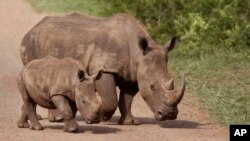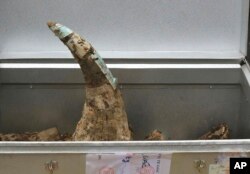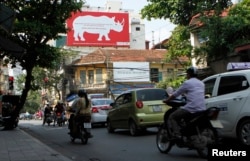Illegal activities such as drug smuggling provide critical funding for North Korea’s regime and its military programs. But as international sanctions strangle North Korea’s economic resources, the Pyongyang regime appears to have diversified.
A research report released in September found that more than half of the rhino horn smuggling cases uncovered in Africa in the past 30 years involved North Korean diplomats and that African countries have been reluctant to take tough measures against them even though rhinos are under siege from poachers.
According to the International Rhino Foundation, rhino deaths in Africa may soon outpace births. In 2014, more than 1,200 rhinos were killed in South Africa alone, a 9,000 percent increase since 2007.
South African researcher and journalist Julian Rademeyer, who wrote the extensive report detailing his investigation into rhino horn trafficking in Africa, shares with VOA’s Korean service his findings on North Korea’s rarely mentioned illegal trade, an activity he says continues to grow. His remarks have been edited for clarity and length.
VOA: Tell us about North Korea’s illegal trade in rhino horn and ivory in Africa.
Julian Rademeyer: An analysis that we conducted looking into cases of diplomats involved in smuggling rhino horns and ivory out of Africa over the past 30 years found that North Korean diplomats or diplomatic passport holders were involved in 18 of the 29 cases that we discovered. It was quite a surprising number.
In the late 1980s and early 1990s, there were reports that North Korean diplomats were very much involved in smuggling rhino horn and ivory, particularly out of Zimbabwe. It was believed that that had faded away or disappeared. But in the last few years, starting in 2015, we’ve had a number of cases where North Korean diplomats — in some cases senior diplomats — have been detained or stopped or found with rhino horn and consignments of ivory.
VOA: What do African countries think about North Korea’s illegal activity in their territories?
JR: Many African countries have fairly long-standing ties with North Korea. North Korea currently has embassies in around 10 African states, and many of those countries are reluctant to take action when incidents like this occur, and they tend to, in many cases, turn a blind eye. As a country, North Korea championed many African states … during the liberation conflict that occurred within Africa. If you talk to government officials in a number of those countries, there’s a degree of loyalty to North Korea because of the support for the liberation movements they got from Pyongyang in the 1960s, ’70s and ’80s.
VOA: Are increasing sanctions against North Korea affecting the country’s smuggling of rhino horn and ivory?
JR: One of our concerns is that as tensions ratchet up, as sanctions against North Korea become more stringent, as North Korea’s lifeline, its ability to bring in money from more legitimate sources, is cut back and hemmed in, there is a very real danger that some of these activities could expand, because they need money from somewhere. And certainly their reliance on illicit funds or dark money could grow, and we could see instances like these increasing — the criminal activity that’s been documented over the years — increasing.
VOA: What was the most recent incident where North Korean diplomats or embassies were implicated in rhino horn smuggling?
JR: In May 2015 in Mozambique, Mozambican police detained two men in the country’s capital, Maputo. One of them was a senior diplomat based in the North Korean Embassy in Pretoria, South Africa. The other was a taekwondo master who was later alleged to have been a North Korean spy. The two men were stopped in a vehicle that had 4.5 kilograms of rhino horn and around $100,000 in cash, but they were released and returned to South Africa. The taekwondo master left for Pyongyang a short while later, and the diplomat was ultimately asked to leave South Africa around December 2015.
VOA: Were there cases in which the North Koreans were arrested while trying to smuggle rhino horns out of Africa?
JR: In September and October of last year, in two separate cases, North Korea nationals traveling on diplomatic passports were stopped in a Berlin international airport. One was found in possession of around 76 pieces of worked ivory, and the other was found with around 200 bangles made from ivory. We know that in one case, the diplomat in question, believed to be the trade attaché working out of Zimbabwe for the North Korean government, identified himself as a diplomat who was released without charge.
VOA: Of the uncovered cases, which one was most unusual?
JR: [It involves] one of North Korea’s most prominent diplomats today, Han Tae Song, [who] is the head of the permanent mission to the United Nations in Geneva for the country and serves as the ambassador to Switzerland. In 1992, he was expelled from Zimbabwe, accused of smuggling several rhino horns out of the country in a diplomatic bag. At the time, the country’s state-run newspaper reported that the government filed its own course of action, [which] was to deport him as an undesirable character whose activities are incompatible with the status accredited to diplomats.
The issue came to the [fore] again recently following his appointment in Switzerland. It’s a claim that has been vehemently denied by the North Korean Embassy there. They have described these claims as pure invention. And, the Swiss authorities have said that they are aware of the allegations against him but the appointment has been accepted.
VOA: Why are North Korean diplomats involved with rhino horn and ivory smuggling operations?
JR: The diplomats that we looked at spoke more broadly about illegal activity involving North Korea. One of the diplomats that I interviewed said that he was aware that things like rhino horns were being shipped from Africa to China and all of this was done for a dual purpose. One is that diplomats in North Korean embassies earn very small salaries. A diplomat, for instance, can expect to earn a salary of around $1,000 a month. Lower-level officials, you’re looking at $400 to $700 a month. But they also are required to pay loyalty money back to the regime in Pyongyang, and that they would do through a range of activities including [rhino horn and ivory smuggling].
VOA: How do North Korean diplomats smuggle rhino horns?
JR: What normally happens in most of these cases is that poaching syndicates will obtain rhino horn. They will then move it up the chain to middlemen who will look for buyers. And I think it was … these diplomats or people that they knew who would then obtain the rhino horn and sell it to them. So I think they are actively looking for it, and then it appears that [two North Korean diplomats who were caught smuggling it] were traveling to China. One was flying to Shanghai, and the other was going to Beijing. And that’s where the market is. The primary markets of rhino horn are in Vietnam and China.
VOA: Who buys the smuggled rhino horn and ivory?
JR: If you go back a few years, there was a significant demand in Vietnam for rhino horn [due to its] medicinal properties. A myth began in Vietnam that a [senior party official] had been cured of cancer by using rhino horn. There’s no basis to the story. … So you have people who were buying it, particularly cancer patients and others also using it for other supposed medical properties. But in more recent years, we’ve seen rhino horn evolve into a luxury product, something that people as a symbol of status, something that they buy as a symbol of untouchability. And in the last few years, there has been growing demand for rhino horn bangles, bracelets and necklaces, particularly from Chinese buyers. There are number of different markets, and the markets keep evolving all the time.
VOA: Are there more cases involving North Korean diplomats still to be uncovered?
JR: I think so. I think there has been quite a lot of work done over the last 20 years looking at these issues. But it’s an extremely difficult area of investigation. These are closed embassies. There’s very little interaction between diplomats at those embassies and outsiders. As I said, 18 incidents over the last 30 years that we know of is probably a fraction.
Jenny Lee contributed to this report.














